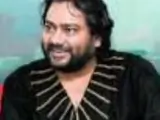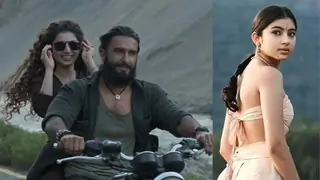DEEWANGEE
Hindi, 2002; color, 165 minutes; with Ajay Devgan, Akshaye Khanna, Urmila Matondkar, Seema Biswas, Suhasini Mulay, Farida Jalal, and Suresh Oberoi.
Lyrics: Salim Bijnori & Nusrat Badr
Music: Ismail Darbar
Director: Anee Bazmee
It is often argued apropos of Hindi films that they are "copies" of Hollywood films, and films such as Deewangee, which is about obsessive love, appear to be particularly susceptible to this charge. I have heard it remarked that Deewangee takes its plot almost entirely from the Hollywood film Primal Fear (with Richard Gere and Edward Norton). Typically, when this charge or comment is offered, it is not only assumed that the concept of "copy" is entirely transparent, but that the realm of "the copy" is easily and justifiably demarcated from the realm of what might be termed the "original". What if, however, the copy should be rather more interesting, or energetic in its suggestions, than the original? Do Hindi "copies", assuming that they are copies, still follow the cinematic traditions of Bollywood, and if they do, do they not cease to be copies? And are there moments when the copy appears to be strikingly original, whereas the original is already prefigured in the cinematic traditions and social conventions of a particular culture? Strikingly, Deewangee itself offers some thoughts on these matters, though perhaps viewers riveted to the plot may overlook these indulgences.
Deewangee hovers around the obsessive love of Tarang Bhardwaj (Ajay Devgan) for a successful singer, Sargam (Urmila Matondkar). A flashback mid-way through the film reveals their childhood friendship: with little Sargam on the swing, Tarang serenaded his Radha on the flute. The families move apart; years later, as Sargam struggles to make a career for herself, Tarang reappears in her life and sweetly coaches her to stardom. This motif, too, has been encountered numberless times in the Hindi film: what she takes to be pure friendship is construed by him as romantic love, and Tarang begins to imagine that he has every right over Sargam. In their innocence, women such as Sargam are incapable of understanding that, from the male perspective, close friendship between the sexes is always an invitation to intimacy. Indeed, it is to him a palpable truth that she desires him as much as he desires her, and there are moments when he speaks of her as his "wife", as though the condition of wifehood was attached to no material reality but was only a state of being. Here the film betrays a rather inadequate understanding of the mythic traditions that it draws upon: Radha was not only never Krishna's wife, but perforce had to be someone else's wife. Love is never so engaging as when it requires risk-taking; thus Krishna and Radha's trysts are dangerous, largely at night, and potentially injurious to her reputation.
It is, however, with the famous lawyer, Raj Goel (Akshaye Khanna), whose reputation stands on the fact that he has never lost a case, that the film commences. At a party to celebrate the success of the music company for which Sargam has recorded "her" songs, Sargam and Raj have their first encounter; and nearly in its immediate aftermath, Sargam appears at Raj's residence since her "guru" and friend, Tarang, has apparently been caught red-handed fleeing the scene of the murder of Ashwin Mehta (Vijayendra Ghatge), the owner of the music company for whom Sargam records her songs. This appears to be an easy case for the police, but Sargam is convinced that Tarang could have had nothing to do with the murder. Raj is asked to take on the case and prepare Tarang's defense. He does so assiduously, and recruits a psychiatrist (Seema Biswas) to his team. Numerous sessions with Tarang convince her that Tarang has a split personality: his other "half", Ranjit, commits the crime. The insanity defense wins Tarang his release, and as Raj conveys the news to him, Tarang lets it be known that he DID in fact commit Ashwin's murder. Tarang himself invented Ranjit. Raj and Tarang will hereafter attempt to outsmart each other: whereas Raj's endeavor is to get the case reopened and have Tarang committed to custody, Tarang struggles to steer clear of the law's tentacles and abduct Sargam to some imagined paradise where nothing will exist apart from the two of them and their music.
Howsoever predictable the plot, Deewangee has its interesting moments. Viewers may not view Deewangee as one of Bollywood's "city" films, a story of the villager arrived in the city, but that is surely one plausible reading of the film. Tarang is at first the country bumpkin who must face the sophistication of the big city and the large array of professionals -- lawyers, judges, psychiatrists, custodians of the law, business executives -- whose expertise is designed to humble him at every turn. Yet, evidently, this country bumpkin is capable of playing an elaborate hoax, and the cunning of a home-grown fox, so to speak, puts the law in its place. There comes an extraordinary moment when, following his acquittal, Tarang confesses to the crime with the observation that he read about split personalities in a book that fell into his hands when he was still a mere villager. Somewhere in the recesses of his mind he stored away this knowledge. Much later in the film, as Raj has the case reopened and Tarang is about to be hauled away by the police, Tarang again challenges him with the remark that he has every confidence that he can equal Raj in the court of law. He read law books as well in his village days, suggests Tarang. These are not only instances of metropolitan forms of knowledge widely available, but of local knowledges in conversation with metropolitan knowledges and urban life forms.
Much revolves around the politics of knowledge in Deewangee. Does the film merely suggest that the insanity defense is easily appropriable by clever men, or is there a more radical suggestion that such defenses are almost always a hoax? The psychiatrist, unlike the doctor, is not a common sight in Hindi films, and one must pause to consider why the psychiatrist occupies a prominent place in this film. Deewangee does little to place the psychiatric profession in an appealing light. The obsessive love which leads to a calamitous end for those obsessed is itself a rather recent characteristic of the Hindi film, dating back to not more than 10 years ago. Those thwarted in their love typically took to the bottle in the Hindi film of the previous generation; they are more likely to take to a carving knife in the present generation, and their obsessive love cannot conclude with reconciliation or some form of accommodation. In this respect, as in many others, Deewangee does not share in the mythos of the Hindi film, and shows itself to be, in its fundamental impulses, a foreign import.
























